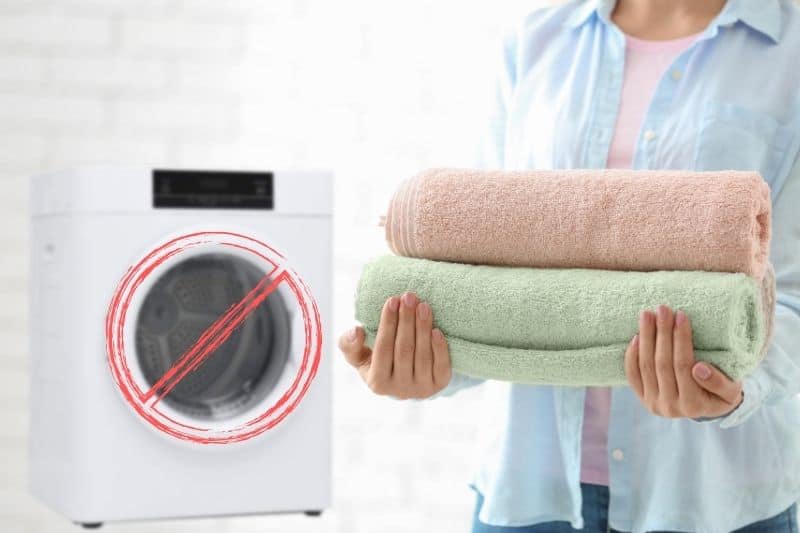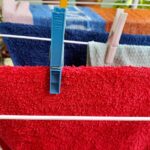Hotels seem to ace washing and drying towels to a fleecy feel almost every single day. But at home, it’s a completely different story… Getting towels to a relatively smooth texture is hard work!
But are we destined to only have rough towels in our homes? Not at all!
Keep on reading to find out how to keep your towels soft without using a tumble dryer.
Towels, once they’ve been washed and dried a few times, start to get a little crunchy. And this isn’t necessarily a good thing when you’re drying yourself.
All you really want is a snuggly and fluffy towel to dry yourself… but how can you keep towels soft without going out to buy new ones all the time? Keep on reading to find out what you need to do!
Solution 1: Cut the Amount of Laundry Detergent in Half
Sadly, not many people realise that overusing detergent is a bad thing. On the contrary, a lot of people think that using lashings of detergent will help to clean their towels and make them smell fresher.
It’s not actually the case because too much detergent can actually make towels quite stiff and packed full of soapy residue! This in turn makes towels feel really tough and the opposite of a fluffy paradise…
So, to solve this problem all you need to do is halve the amount of detergent you use in your washing machine when washing towels. Plus, if you do drop your dose to half of what you’d normally use, you’ll also be able to save a few pounds here and there on detergent!
Solution 2: White Vinegar
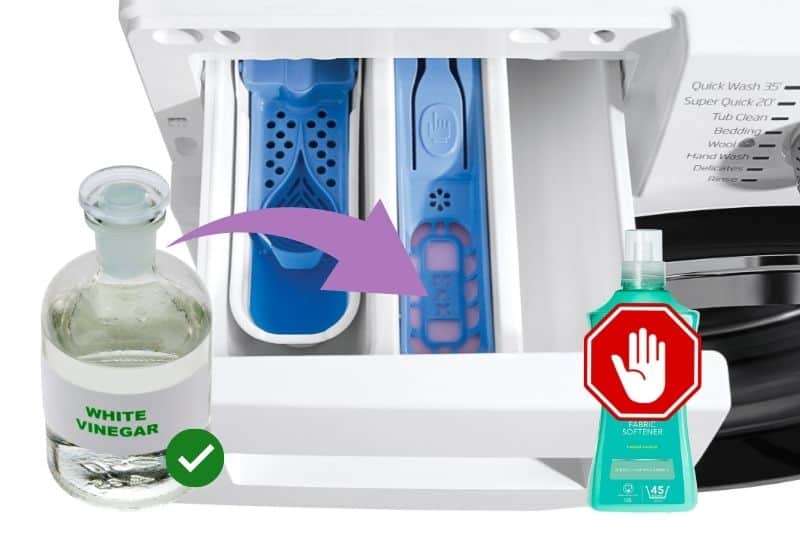
White vinegar is a classic cleaning agent and it’s also good on fish and chips. So, you may be wondering why I’m telling you to douse your clean towels in fragrant vinegar…
The simple answer is, yes vinegar does smell, but that smell will go when your washing machine performs its final rinse. And if it’s still lingering just run another hot wash.
But smell aside, white vinegar is great at removing soapy residues from towels. In doing so it can make towels feel all soft!
All you need to do is add about a quarter to a half cup of vinegar into the fabric softener compartment in your washing machine’s drawer during the rinse cycle. The vinegar will sort the rest out for you.
Do not add fabric softener into the wash if you plan on using vinegar though – this won’t go down too well.
Solution 3: Towel Rotation
Towels get tired and crinkly over time, so why not swap your towels with other towels in your house from time to time.
For example, if you have a pile of four blue towels that you use and clean in week one, clean and swap them for a pile of four red towels for week two, then swap again for week three and so on.
Rotating your towels will help your towels to last a little longer because they’re not constantly being subjected to washing, drying, drying, washing and so on!
In a nutshell, give your towels a rest now and again.
Solution 4: Stop Lint Transferring Between Clothes and Towels
A really simple way to keep towels smooth, without using a tumble dryer, is to make sure that you wash your towels together. This means that you don’t mix your towels with other clothes when you wash them.
Mixing clothes, towels, and bedding up in one wash may seem like a good idea. It does save time, and you don’t have to pop the washing machine on multiple times and you can save on capsules.
But when you wash everything at the same time, a lot of lint gets passed around. In the end, you get a sort of bobbly look on your laundry, and you’ve got to spend time removing the fibre-y mess.
If you just separate everything into piles, you’ll soon find that this problem significantly reduces and your towels will feel a lot smoother.
Solution 5: Pick a Fabric Softener for Your Towels
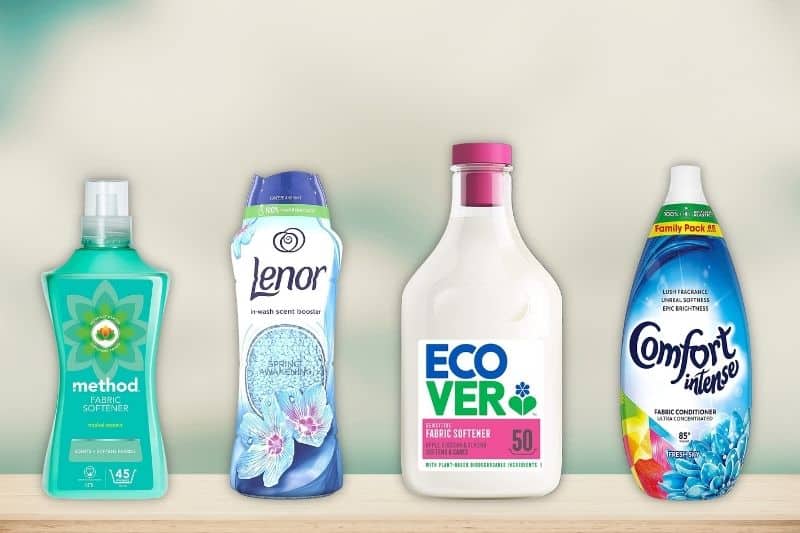
If you’re looking for a very quick and easy solution to keep your towels soft, then you could look into buying a fabric softener.
There are loads of fabric softeners available to buy today, and a lot of them come with special perks, so it can be tiring trying to choose 1. Luckily for you, we’ve done all the hard work – check out our post on the best fabric softeners and conditioners in the UK.
All you need to do once you’ve picked an item to use is to follow the instructions on the packaging!
Solution 6: Use Water Softeners in Your Washing Machine to Soften Towels
In some areas around the UK hard water makes cleaning general laundry quite difficult. Generally, those who live in hard water areas note that their clothes, towels, and bedding are often clogged with small mineral deposits when they come out of the washing machine.
These deposits are incredibly annoying to have to deal with, but it’s just as well that there are a number of products in UK supermarkets that are designed to combat this issue.
One of these products is in Calgon. Calgon is a well-known water softener that is completely safe to use in your washing machine – with or without clothes.
It’s designed to soften the water inside the machine so that clothes aren’t soiled by mineral deposits and appliances aren’t clogged with limescale.
If you wash your towels in Calgon, not only will the water in your washing machine be much softer, but your towels will thank you for it too! There are also several great alternatives to Calgon, which should give you similar results.
Solution 7: Air Dry Towels to Keep Them Smooth
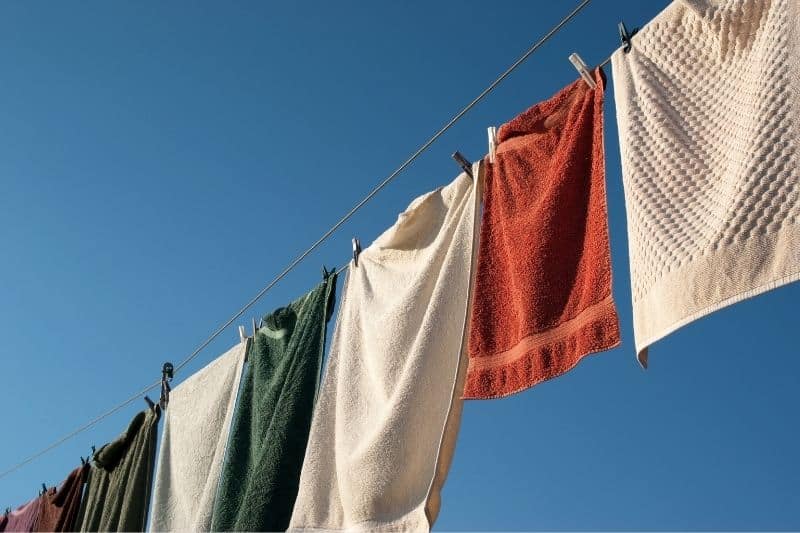
This next suggestion will probably be low down on this list given that we live in the rainy UK. But one way of keeping towels soft is to air dry them.
You need fine, dry weather that’s preferably on the warm side to yield the best results!
All you need to do is peg your clothes outside on the line and leave them to bask in the sunshine. Not got room for a line? That’s no problem, just use a clothes horse (clothes rack).
Solution 8: Don’t Over-Pack the Washing Machine with Towels
We all lead busy lives, so packing a whole load of washing into one cycle is something that we do now and again. It’s not necessarily a good thing though because it strains the machine and laundry doesn’t always come out all that clean, but more importantly…
If you overfill your washing machine with loads of towels, they’ll get really heavy, they may not wash as well as you’d like them to, and your towels might come out a tad rough.
One way to overcome this bristly problem is to manage your laundry better.
Around 5 towels to 1 washing cycle are about the right amount that you should put in. This will ensure that the washing machine can clean all the towels properly, the weight is distributed evenly and the towels should come out softer because they’ve been cared for better.
Solution 9: Choose a Lower Temperature to Keep Towels Soft
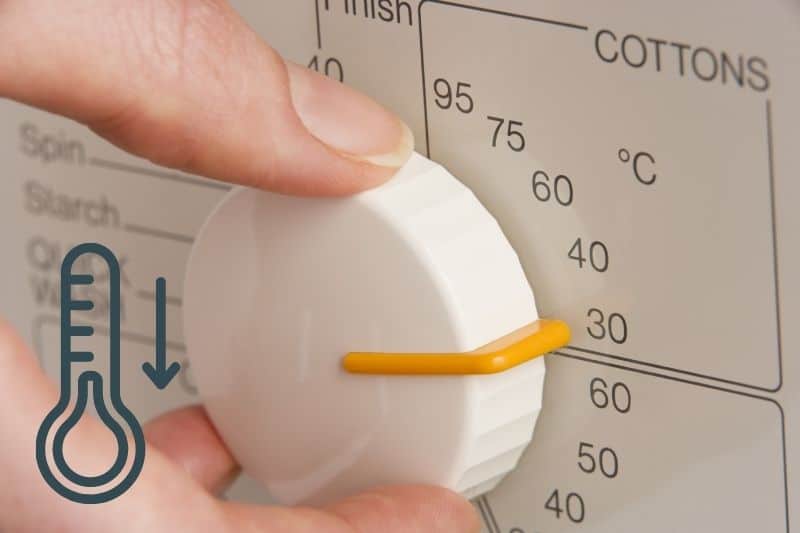
Heat may be good at removing bacteria from towels but too much warmth can also damage the fibres in towels. This in turn leaves towels feeling quite scratchy and uninviting!
To reduce this problem all you need to do is lower the temperature of your washing machine down to around 30/40 ℃ and wash your towels as normal. This will stop the material from suffering at the hands of the extreme heat.
Solution 10: Sort Out Wet Towels Immediately
A super simple way to make sure towels stay softer for longer is to pull them out of the washing machine as soon as possible.
There’s really no time like the present – as soon as the machine stops, grab your towels out of the machine one by one, shake them (to get rid of excess moisture), and put them on the line to dry! It’s really as easy as that.
Leaving towels sitting in a washing machine just doesn’t do them any favours. Not only do wet towels that have been left to sit in a washing machine start to smell, but they can also promote mildew.
This means that you have to wash the towels again – which is a needless hassle and expense if you ask me.
Solution 11: Let Towels Dry Before Folding and Putting Them Away
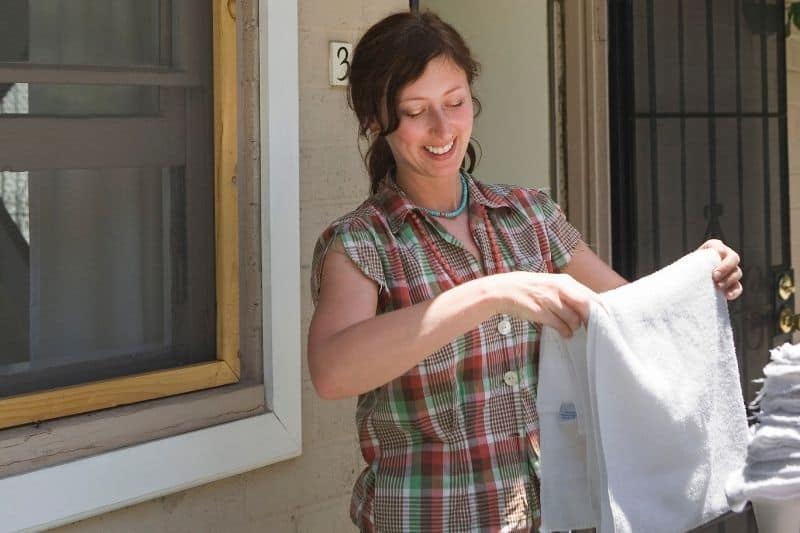
Living in the UK means that whenever you put laundry on the line, you’ve always got to keep an eye out for grey clouds too.
So, when the rain does eventually fall onto your almost dry towels, don’t assume that you can just fold them and put them away! This makes your towels go all stiff because the excess moisture hasn’t been removed completely from the material.
In order to solve this problem, you need to make sure that your towels are dry before bringing them in off the line/clothes horse, and if your towels aren’t dry, either wait for another dry spell and pop them back outside.
Or, grab a clothes horse and set it up in a warm room so the towels can dry as naturally as possible.
It’s not a good idea to put any sort of damp clothing away, always make sure your laundry is as dry as it can be before storing it in a wardrobe/cabinet.
Don’t Dry Towels on a Radiator
As you know, drying towels is exceptionally important, so you may be tempted to speed the process up by putting your towels on the radiator to dry.
This is a bad idea because towels get very stiff and crispy when they’re dried on radiators.
Try and avoid doing this with towels, but if you really need to use a radiator, set up a clothes horse next to it and place the towels on that instead. This way no direct heat will penetrate the towels and dry them out.
Drying clothes and towels on a radiator is a bad idea for several reasons. Not only does it make your laundry stiff, it can also be bad for your health.
Conclusion
It’s really easy to keep towels soft, and it’s not too expensive to achieve great results either. Just try a mixture of the solutions above to keep your towels soft without using a tumble dryer.

Bethan has a passion for exploring, reading, cooking and gardening! When she’s not creating culinary delights for her family, she’s concocting potions to keep her house clean!
